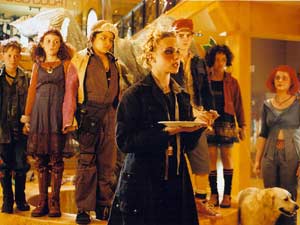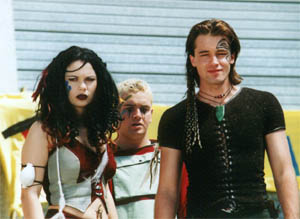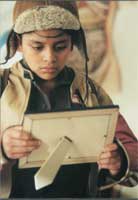 Human communities are held together not only through geographical proximity but through common attitudes and values.
Human communities are held together not only through geographical proximity but through common attitudes and values.
Your community may feel like an extremely diverse group, but, if you look closely, you will see that every member is similar in many basic ways, the ways that you would not even think to question until you noticed someone from a different community behaving differently.
For instance, you have probably grown up knowing that you do not fart at the dinner table (or perhaps you do!). This is a shared value that you might think is obvious, but, in a different culture, the exact opposite may be true.
Likewise, it may seem obvious to you that one does not use racial slurs, or perhaps that one does not whistle at pretty girls, or even that one does not jump rope after 5 o’clock. Whatever your values are, many of them are part of a system of shared values that you hold in common with the people around you.
You are undoubtedly a simultaneous member of several communities. For instance, you might have a family community, a neighbourhood community, a school community, a sports-team community, and an online community. And each of these communities comes with its own shared system of values, and it’s own unspoken canons (or laws).
You might share your eating habits with your family, your language and slang with your neighbourhood, your attitude with your school chums, your field etiquette with your sports team, and your passionate interests with your online pals. (Yay for gross oversimplification!)
How did you learn to put a quarter-inch thick pad of margerine on your toast? Why is it that you and your online friends all type LOL when you think something’s funny, when at school you would just smile?
These are all learned behaviours.
 You and Your Selves
You and Your Selves
You are many interesting people. (Yes, you. ….No. Just you, silly!)
People play different roles around different people. It isn’t lying, it isn’t even being fake. It is simply that we choose to show different aspects of ourself to different people.
You probably aren’t as crass around your grandmother as you are around your friends. She might get a glimpse of a quieter, more loving you than your friends will ever see.
Imagine if you acted as open at a job interview than you are when you are talking online! It simply wouldn’t be appropriate. Your new boss probably isn’t interested in knowing all the mushy details of your love-life.
You probably have a slightly different relationship with every single person that you know, requiring you to act slightly different around them than around anyone else. For every single person that you know, you have another self.
So when you meet a new person, you literally reinvent yourself, creating a new copy of yourself to share with them. How do you know which bits and pieces of you to put into the self you are making for your new friend?
Certainly not constantly through trial and error.
You feel your way around, using a vocabulary of responses. Age: Young –> Conversation: Casual.
How I Learned to Draw (plus an embarrassing story of potty-training gone awry)
How did you learn all of these complicated rules for relationships, composure, and behaviour?
Role Models.
You learn the rules of your community from the community itself. You have been watching the people around you for longer than you can remember. It was through role models such as your parents, baby-sitters and siblings that you learned how to speak, first learning what sounds to form into words, and then learning what order to throw your words into when making a sentence.
It was role models who taught you to use the toilet, what clothes look good together, what you want to do with your free time.
 Humans are little more than an advanced species of parrots. We learn who we are by replicating the creatures around us (yes, ‘creatures’! When I was younger, I made the embarrassing mistake of learning where to go to the bathroom from the family dog. Oops! …for the enquiring minds out there, yes, I have since corrected that oversight. Moving on….).
Humans are little more than an advanced species of parrots. We learn who we are by replicating the creatures around us (yes, ‘creatures’! When I was younger, I made the embarrassing mistake of learning where to go to the bathroom from the family dog. Oops! …for the enquiring minds out there, yes, I have since corrected that oversight. Moving on….).
If we did not learn from each other, we as a species would never move forward. Worse yet, we would have no way of communicating with each other—we would all speak and live with a personal vocabulary of behaviour.
The older we get, the more we understand the basic expectations of our community (although social faux pas are sure to continue happening on occasion). Without these basic details to focus on, we are able to look to special role models in order to specialize ourselves.
Children often pick celebrity role models in specialized fields of interest, for example closely following the life and work of a cartoonist or a figure skater, replicating their manner of speech, their way of dressing, and their talent.
Getting On while Moving On
Probably the most important role models for children are their teachers, their parents, and their friends. The more independent kids become, the more they begin to use their friends in the place of their parents as role models. Still, children must learn the skills of adult life (cooking, shopping, money management, acting too serious) from the adults in their life.
For the characters in The Tribe, there are no longer adults around to show them how to cook a balanced meal, or how to keep the dishes sanitary. The kids are left to base their actions on their memory, and on trial and error.
Even though they are all supposed to be children, the characters seem to separate along age lines to create boundaries parallel to the child-adult distinction. Older characters like Salene and Amber are thrown into the role of adults, acting almost as parents, and serving as the new role models for the younger children.
The only role models that these older characters have to support them are their memories of their parents, and the different strengths of their friends.
They quickly learn what adults are often reluctant to see: children make great role models. The Mallrats and other functional tribes have taken the playground understanding that your friends have much to teach you, and they have turned it into a way of life. The adage, “respect your elders” makes way for the new rule on the street: “respect your peers.”
And the children challenge themselves to be their best self, to live in a way that will make them a good role model for the kids around them.

